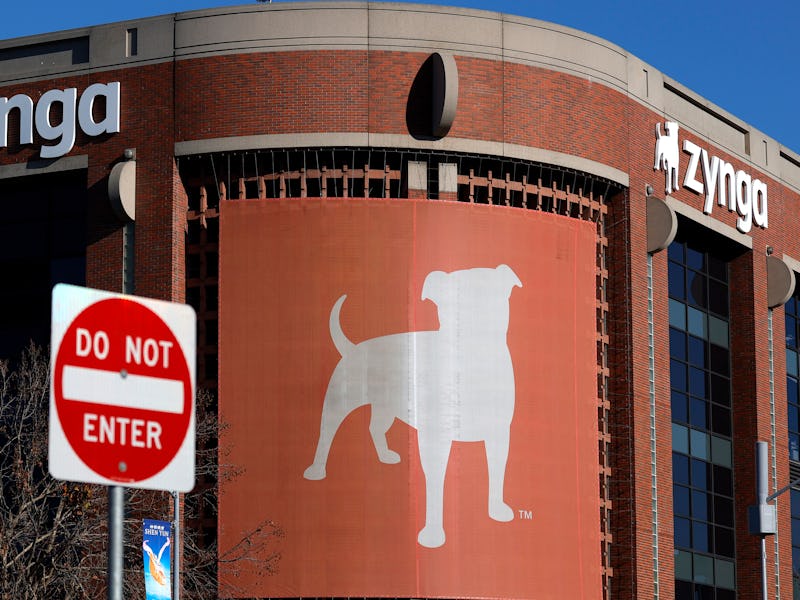Analysts reveal the hidden costs of Take-Two's historic Zynga acquisition
A big move that could have ramifications down the line.

The most expensive acquisition in the history of the video game industry became public knowledge on January 10 when publisher Take-Two announced it intends to purchase Zynga with a cash and stock deal valued at $12.7 billion. For perspective, that’s a whopping five million more than Microsoft’s purchase of ZeniMax/Bethesda for $7.5 billion. According to Piers Harding-Rolls, an industry analyst at Ampere Analysis, it’s a smart move for a company that already owns huge properties like Grand Theft Auto, Mafia, Borderlands, BioShock, and NBA 2K. Now it’s got a big foot in mobile gaming, but who is that actually good for?
“Zynga gives Take-Two a substantial turn-key mobile business, which can support its expansion in the fastest-growing part of the market,” Harding-Rolls says. “It makes Take-Two’s mobile games business much more comparable with its long-time competitors EA and Activision Blizzard. The acquisition allows Take-Two to diversify its audience immediately and expand its global reach.”
Zynga’s portfolio includes some massive properties like Farmville, Words With Friends, and the upcoming Star Wars Hunters.
It seems like the key motivator behind this purchase was Zynga’s expertise in mobile gaming, which other major players like Activision and EA have already spent years moving in on. But that doesn’t make it clear why Take-Two was willing to spend so much.
“I think that the record-breaking $12.7 billion was the price it had to pay to dissuade its competitors from pulling the rug under its feet, as EA did with Codemasters in 2021,” George Jijiashvili, an analyst at Omdia, tells Inverse.
Take-Two originally put a bid in on Codemasters in early 2021, but ultimately lost the acquisition to EA. The company’s CEO, Strauss Zelnick, has since vocalized his disappointment over the loss. With that in mind, it makes sense that Take-Two would go all-in on Zynga, which will undoubtedly change the trajectories of both companies.
Consider that we’ve never seen an original Grand Theft Auto mobile game. Previous console entries have been ported to mobile platforms, but there’s never been a bonafide GTA mobile game akin to Call of Duty: Mobile, which seems more than 6 million players daily. It’s doubly surprising that there’s no mobile version of GTA Online, which reportedly makes Take-Two almost half a billion dollars a year.
Analyst Manda Farough with F-Squared believes it was only a matter of time before Take-Two realized the opportunities in mobile gaming.
“Take-Two has been leaving money on the table with their intellectual properties (especially Rockstar's) for years by not having a reliable, talented network of mobile development studios that can bring their cherished IP to mobile and, by extension, to Asian players,” she says. “Zynga's suite of studios is an excellent investment for Take-Two, which will need all of the mobile support that it can get to bring its games to audiences that may not have consoles or PCs.”
Despite the overwhelming success of GTA Online, the only mobile games of the series are ports of older titles.
Of course, there’s no guarantee that these two companies will immediately mesh well. They both have very different approaches to game development, and there’s the simple fact that consolidation of this ilk often leads to layoffs.
“There are a few challenges a combined entity faces,” Harding-Rolls explains. “One is cultural. While both are public companies, Take-Two is often more wait-and-see when it comes to innovation (part of the reason behind its less-developed mobile games business) whereas Zynga can be considered more on the front foot when it comes to innovation. Can these cultures work together and be successful?”
Amidst what could theoretically become a culture clash, there’s also a troubling trend in the bigger picture: The homogenization of the video game industry.
The business of making games is a challenging one with complicated technological systems and many different people working together. Hardships related to Covid-19 make it particularly challenging. At the same time, consolidation can oftentimes lead to a lack of creativity as different studios adapt to the demands of parent companies that, more often than not, lean towards trends.
A prime example is BioWare’s Anthem, a game that tried to chase a trend set by Destiny but ultimately failed because of the developer’s inexperience with that style of game. EA is also notorious for making studios use its Frostbite engine as a kind of “one size fits all” solution. (Can you really use the same game engine for a high fantasy adventure and ... hockey?)
Anthem is a prime example of a developer being affected by homogenization.
The same can be said for Marvel’s Avengers, with Square Enix straight-up admitting that Crystal Dynamics was the “wrong fit” for the game. All that to say nothing of how all sorts of game publishers have chased trends like Fortnite’s battle royale or Breath of the Wild’s open-world to varying degrees of success.
Consolidation does not necessarily lead to the death of creativity. By all accounts, Elden Ring — which is ostensibly the marriage of Dark Souls and Breath of the Wild — looks like it’ll be a riveting success. But as more of the industry gets pulled under the umbrella of fewer companies, it becomes more likely that the trend towards monopolies overlaps with a trend towards monotony.
“Consolidation seems like a win-win,” Bloomberg’s Jason Schreier argued in March 2021. “Sellers can guarantee themselves stability, while buyers get more content to serve a fanbase that’s hungry for new games. But there are also costs. An industry dominated by a handful of big companies could eventually lead to creative stagnation and other symptoms of monopolization, like limited choices and higher prices.”
While Take-Two and Zynga may have set the current record for the most expensive acquisition, that’s sure to change as the industry leans ever closer to consolidation.
This article was originally published on